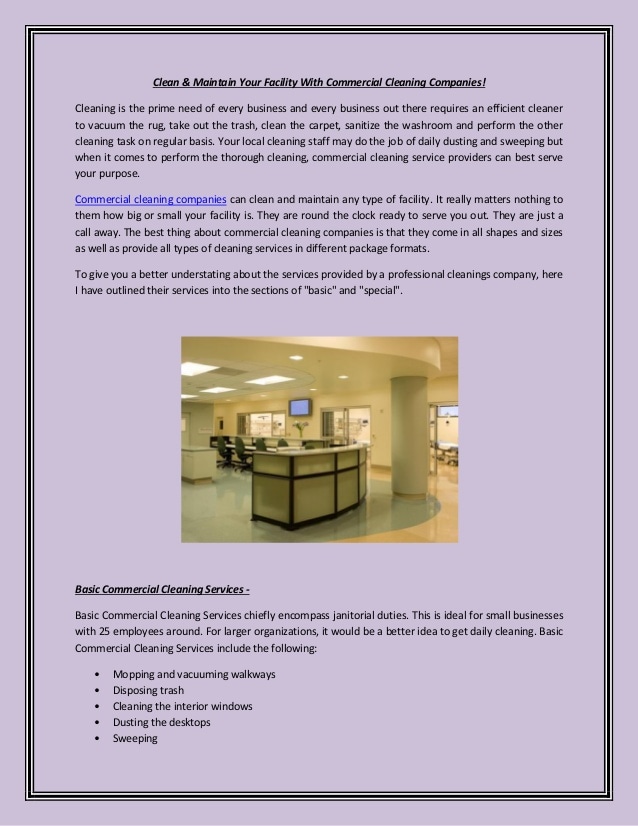Starting a commercial cleaning business is not a big deal, but there are a number of things you need to consider before making a move. Depending on the area you live in, the cost of start-up capital for a commercial cleaning company will vary. The average start-up fee is $30,00 to 120,00. However, your city has an enormous impact on your start-up expenses. Commercial cleaning companies need to get a lot traffic in order make money.
Commercial Cleaning: How to Find a Good Company
If there are many establishments and businesses in your area, chances are you will also have clients. This means that you need to charge a high hourly fee for your services. However, you should set a reasonable price for what you do. Professional cleaners charge reasonable rates. Clients will prefer them. If you are looking to make profits, your starting capital should also reflect that.
Commercial Cleaning: How to Find a Good Company
It would be a better idea to offer value-added cleaning services to your clients. So that clients don’t have to waste time looking for a commercial cleaning service, you can offer them packages. These packages are popular with many potential clients, so it is easy to gain clients if you offer them. Instead of charging an hourly rate, you could offer them a flat fee or a monthly fee for cleaning.
Commercial Cleaning: How to Find a Good Company
Because you’ll only be managing a few residential homes, your initial capital will be lower if a small business is starting. Even if you manage a few residential properties, you still need to have many buildings to clean. It is important to invest in more residential buildings to build a solid financial base. Your goal is to provide excellent cleaning service for all the buildings you manage.
Your target market should also be determined by the amount of money that you can afford to spend. Your target market might differ depending on the services you offer. If you’re planning to offer residential cleaning service, you should concentrate on residential buildings only. Targeting large numbers of commercial buildings can help you maintain a competitive edge. Large commercial clients usually have larger budgets, so there’s no harm in providing residential cleaning supplies to these clients.
Once you have determined your target market and your starting capital, the next step in starting a commercial cleaning business is finding a commercial building to clean. You can search the internet for possible commercial building clients. These companies have many services and can be visited on their websites. Look at the packages and services they offer. Check that you understand the terms and conditions of your contract. You might also want to look at other companies and their offers to be able to compare them.

Once you’ve found a company with a great reputation and offers value-added service, you can call them to arrange an appointment. You can also use the internet to create a blog if you plan on cleaning large buildings or offices. You can tell your clients about your project and you can update them about the progress on your blog. This can be very effective especially if you are still learning the ropes. You can also create Facebook and Twitter accounts to reach your target markets easily. This will allow for you to build a client database and enable you to promote the business to these people frequently.
You should keep your clients informed through your blog. You can also send them updates via social media and offer a discount if you refer your service to your friends and colleagues. You can even make a video about your cleaning services that you post on YouTube and other social networking sites. This is a way to reach your target market, and convince them that your company can do the job. It can be a very profitable move for your business to hire a commercial cleaner. But there are some things you need to consider so you don’t feel overwhelmed by the decision making process. You should make sure you are choosing a company that offers value-added service so that you don’t lose potential clients because of low prices or unprofessional service.